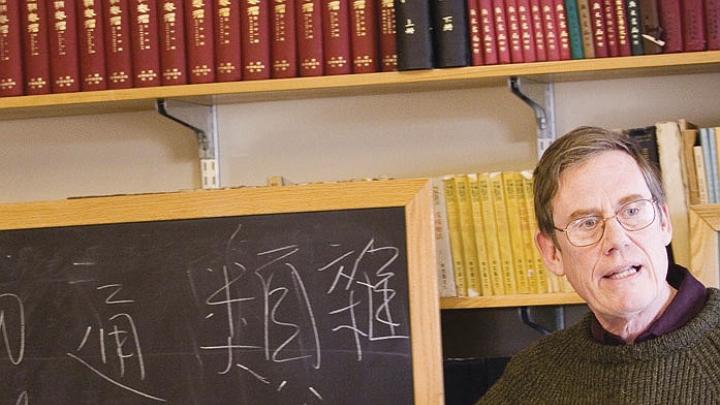The evolution and adoption of online learning technologies, and other efforts to enhance teaching, continued briskly as the fall semester began. Some highlights:
• President emeritus Derek Bok, a champion of improved pedagogy, publicly embraced the potential for education technology to enhance the classroom in a September address marking the six-hundredth anniversary of the University of St Andrews. The collaborative nature of preparing an online course, he said, makes it “less intuitive and more a product of conscious deliberation” in deciding how best to present each concept and in what order. Moreover, he noted:
For hundreds of years, only students have known much about how well or badly they are being taught.…In an online course, every statement professors make, every question they ask, and every answer students give can be recorded. By examining this material, instructors can discover much more about what their students are learning easily and what material is giving them trouble. This change alone will make professors more aware of their effect on students and hence allow them to become more proficient in helping students learn.
He also foresaw a welcome deemphasis on pure lecturing and greater use of “more active forms of learning, such as problem-solving, socratic discussion, and group projects”—all productive in “giving students a deeper understanding of the subject and helping them to develop the skills of critical thinking and analysis that faculties have long considered the most important goals of a liberal education.”
• On-campus curriculum and digital facilities. Harvard School of Public Health, assisted by $300,000 in planning funds from the Harvard Initiative for Learning and Teaching (HILT)—apparently one in a series of such grants—and substantial philanthropic support, announced a wholesale revision of its master’s degree programs and a new doctorate in public-health leadership. It aims to deploy “more case-based and field-based ‘real world’ learning opportunities” and to “accelerate efforts…to develop ‘flipped classroom’ experiences, in which lecture-style material is delivered increasingly online before class, while classroom time is spent by students and faculty actively engaging together to develop strategies for solving the types of problems students will encounter in their careers.”
HILT has also underwritten digital infrastructure, including the new “video-capture studio” in Widener Library. There, faculty members can use high-definition production equipment or experiment with inserting online lectures, learning exercises, demonstrations, and visual materials into their courses. The Faculty of Arts and Sciences (FAS) and HarvardX, the online learning program, will manage the studio. HILT funded FAS’s construction of the “SciBox” in the Science Center, too: a flexible, open lecture, lab, and discussion space—with built-in telecommunications and adjacent 3-D printer and tools—in which different modes of teaching and learning can be blended together during a single class meeting.
• Provostial point person. To coordinate and enhance such efforts, University provost Alan M. Garber has created a vice-provostship for advances in learning and named Carswell professor of East Asian languages and civilizations Peter K. Bol to the post. Bol has used technological tools extensively in his research and teaching, and leads University efforts in geographical information systems. His online course, SW12x, “China” (taught with William C. Kirby, Chang professor of China studies and Spangler Family professor of business administration), debuts in October, and is being offered simultaneously in the College and through the Extension School.
Some faculty members were disquieted when edX debuted in the spring of 2012 without announced faculty leadership or an advisory committee (which has since evolved). As vice provost, Bol brings a senior professor’s perspective to oversight of both HarvardX and HILT, which will report to him, as University and individual schools’ policies and investments evolve.
• Online curricula. To date, most courses offered by faculty members from Harvard, MIT, and edX partner institutions (as well as those on the for-profit Coursera and Udacity platforms) have been one-off efforts—a concern for professors who envision students learning their way through a planned curriculum. In September, MIT faculty members began to address that deficiency, introducing the XSeries of sequential courses and shorter modules—in the foundations of computer science, and supply chain and logistics management—meant to give students progressive learning opportunities equaling two to four residential courses and culminating in certificates of content mastery.
• edX ambitions. edX itself leased larger quarters in Kendall Square, pointing toward a staff of 90 to 100, according to news accounts, by the time the organization moves, in January. Separately, it announced an open-source agreement with Google, called MOOC.org (the acronym for massive open online courses), through which anyone can use the software without joining the edX partnership. That holds potential for rapid adoption of edX technology as a standard to create and host courses globally—and perhaps for edX’s effort to develop another stream of revenue. No indication was given about potentially hosting advertising, Google’s principal business strength.
• Broader policies and university engagement. How faculties develop, control, and are compensated for their work on online courses that may be used far beyond their campuses is far from clear, at Harvard or elsewhere. In August, William C. Powers Jr., president of the University of Texas (an edX partner), which is under pressure to deploy online technologies to serve burgeoning enrollments more cost-effectively, disseminated a set of policy principles on these and other matters for discussion among his faculty colleagues. Harvard professors, deans, and the new vice provost may want to attend to that conversation.








